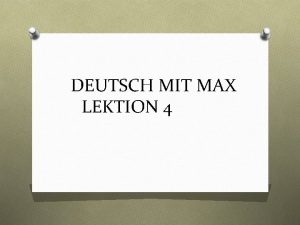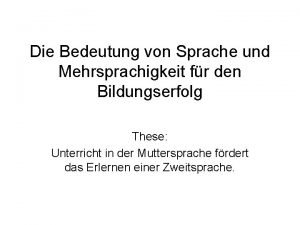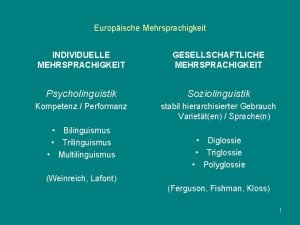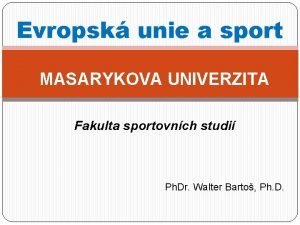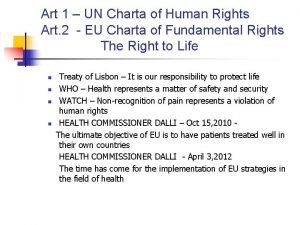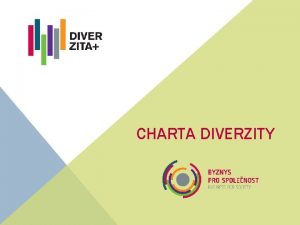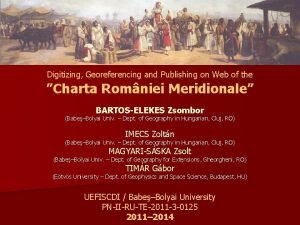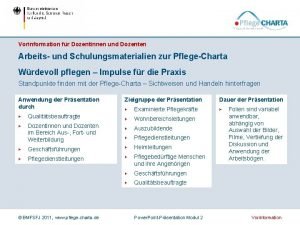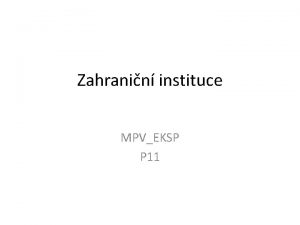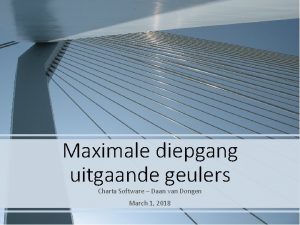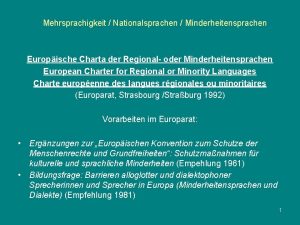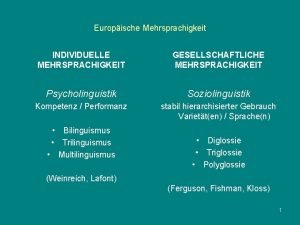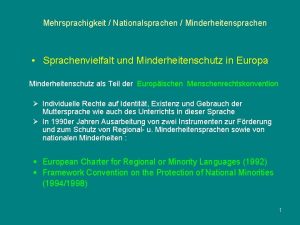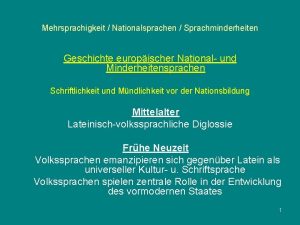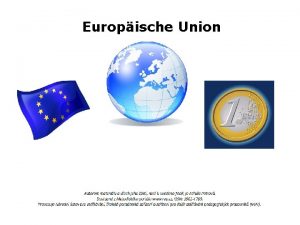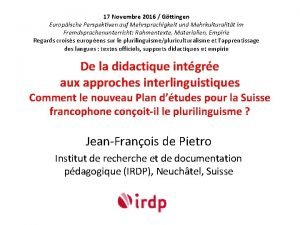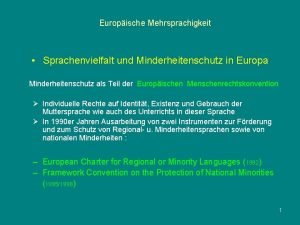Europische Mehrsprachigkeit Europische Charta der Regional oder Minderheitensprachen












- Slides: 12

Europäische Mehrsprachigkeit Europäische Charta der Regional- oder Minderheitensprachen European Charter for Regional or Minority Languages Charte européenne des langues régionales ou minoritaires (Europarat, Strasbourg /Straßburg 1992) Vorarbeiten im Europarat: • Ergänzungen zur „Europäischen Konvention zum Schutze der Menschenrechte und Grundfreiheiten“: Schutzmaßnahmen für kulturelle und sprachliche Minderheiten (Empehlung 1961) • Bildungsfrage: Barrieren alloglotter und dialektophoner Sprecherinnen und Sprecher in Europa (Minderheitensprachen und Dialekte) (Empfehlung 1981) 1

Europäische Mehrsprachigkeit • Rückbindung an Menschenrechtskonvention (United Nations International Convenant on Civil and Political Rights Konvention des Europarats zum Schutze der Menschenrechte und Grundfreiheiten) • Referenz auf KSZE-Arbeit in Präambel • (KSZE – OSZE: Organisation für Sicherheit und Zusammenarbeit in Europa) (Schlussakte von Helsinki 1975 – Kopenhagener Treffen 1990) • Wert von Interkulturalität und Mehrsprachigkeit • Schutz und Stärkung der Regional- oder Minderheitensprachen bedeutet Beitrag zum demokratischen Aufbau Europas 2

Europäische Mehrsprachigkeit CHARTER: PART I / Article 1 / Definitions For the purposes of this Charter: a) „regional or minority languages“ means languages that are: (i) traditionally used within a given territory of a State by nationals of that State who form a group numerically smaller than the rest of the State‘s population; and (ii) different from the official language(s) of that State; it does not include either dialects of the official languages(s) of the State or the languages of migrants; 3

Europäische Mehrsprachigkeit CHARTER: PART I / Article 1 b) „territory in which the regional or minority language is used“ means the geographical area in which the said language is the mode of expression of a number of people justifying the adoption of the various protective and promotional measures provided for in this Charter; c) „non territorial languages“ means languages used by nationals of the State which differ from the language or languages used by the rest of the State‘s population but which, although traditionally used within the territory of the State, cannot be identified with a particular area thereof. 4

Europäische Mehrsprachigkeit Begriffe und Übersetzungsvarianten • „Regional or minority languages“: Regionalsprachen nach territorial-administrativer Gliederung; Deutschland: Bundesländer, Spanien: autonome Regionen, Regionalsprache kann in Territorium Mehrheitssprache sein Finnland: Samisch = „regional minority language“ Minderheit: mathematische / juristische Definition: 50 % der Gesamtpopulation – 1 Person • „Traditionally used“ (frz. „pratiquée traditionnellement“): „herkömmlicher Weise gebraucht“ – Übergabe der Sprache (traditio) an zumindest eine nächste Generation ist Bedingung, Drei -Generationen-Regel bei „traditioneller“ Migration 5

Europäische Mehrsprachigkeit • • • „Official language“ (frz. „langue officielle“): Übersetzungsvarianten im deutschsprachigen Raum: Deutschland und Schweiz: „Amtssprache“ Österreich: „Staatssprache“ (Tichy 2000: 30) • „Languages of migrants“: • „Sprachen von Zuwanderern“: Ausschluss der Sprachen der Migration nur im Hinblick auf „recent immigration“, unterschiedliche • Staatenpraxis: Drei-Generationen-Regel : ca. 100 Jahre areale Präsenz im Staatsgebiet 6

Europäische Mehrsprachigkeit CHARTER: PART I / Article 2 / Undertakings (1) Each Party undertakes to apply the provisions of Part II to all the regional or minority languages spoken within its territory and which comply with the definition in Article 1. (2) In respect of each language specified at the time of ratification, acceptance or approval, in accordance with Article 3, each Party undertakes to apply a minimum of thirty-five paragraphs or subparagraphs chosen from among the provisions of Part III of the Charter, including at least three chosen from each of the Articles 8 and 12 and one from each of the Articles 9, 10, 11 and 13. 7

Europäische Mehrsprachigkeit CHARTER: PART I / Article 3 / Practical arrangements (1) Each contracting State shall specify in its instrument of ratification, acceptance or approval, each regional or minority language, or official language which is less widely used on the whole or part of ist territory, to which the paragraphs chosen in accordance with Article 2, paragraph 2, shall apply. Erweiterung des Anwendungsbereichs der Charta auf „Staatssprachen“ des Merkmals „less widely used“ Beispiel: Schwedisch in Finnland Keine Verpflichtung zur Angabe des territorialen Anwendungsbereichs 8

Europäische Mehrsprachigkeit CHARTER: PART II / Article 7 / Objectives and principles • the recognition of the regional or minority languages • the respect of the geographical area of each regional or minority language • the need for resolute action to promote regional or minority languages in order to safeguard them • the provision of appropriate forms and means for the teaching and study of regional or minority languages at all appropriate stages • to eliminate any unjustified distinction, exclusion, restriction or preference relating to the use of a regional or minority language 9

Europäische Mehrsprachigkeit CHARTER: PART III Measures to promote the use of regional or minority languages in public life in accordance with the undertakings entered into under Article 2, paragraph 2 Article 8 / Education Article 9 / Judicial authorities Article 10 / Administrative authorities and public services Article 11 / Media Article 12 / Cultural activities and facilities Article 13 / Economic and social life Article 14 / Transfrontier exchanges 10

Europäische Mehrsprachigkeit CHARTER: PART IV / Article 15 / Periodical reports (1) The parties shall present periodically to the Secretary General of the Council of Europe, in a form to be prescribed by the Commitee of Ministers, a report on their policy pursued in accordance with Part II of this Charter and on the measures taken in application of those provisions of Part III which they have accepted. (…) three-yearly intervals after the first report. Article 16 / Examination of the reports (1) The reports presented to the Secretary General of the Council of Europe unter Article 15 shall be examined by a commitee of experts constituted in accordance with Article 17. 11

Europäische Mehrsprachigkeit Article 16 / Examination of the reports (3) On the basis of the reports specified in paragraph 1 and the information mentioned in paragraph 2, the commitee of experts shall prepare a report for the Commitee of Ministers. This report shall be accompanied by the comments which the Parties have been requested to make and may be made public by the Commitee of Ministers. (4) (…) (5) The Secretary General of the Council of Europe shall make a twoyearly detailed report to the Parliamentary Assembly of the apprication of the Charter. ****** 12
